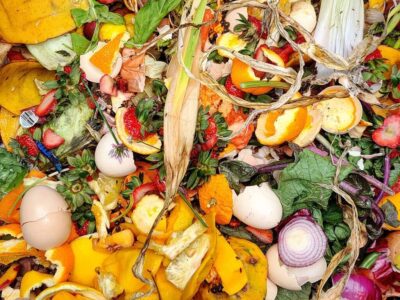By Melissa von Mayrhauser

Columbia has welcomed a composting machine to campus, a first at a New York City university. Accepting food scraps, such as banana peels, coffee grounds and egg shells, the composter will provide a way to recycle the urban campus’s food waste while also serving as an educational tool.
Following over three years of work by the EcoReps composting committee, Housing and Dining Services and the Office of Environmental Stewardship, the composter arrived in February to its home in the Ruggles Residence Hall basement.
Members anticipate that students will begin using it next semester, while they started the testing phase on March 29. An official ribbon cutting ceremony with administrators will occur in mid-April.
Student participants see this as a solid step toward engendering greater environmental action on urban college campuses, which are more limited in terms of space than their rural and suburban counterparts.
“There are a lot of students on campus interested in something environmental, but it’s difficult to find something concrete to do. That’s a big barrier on an urban campus. … If you create an infrastructure change like composting, you create something much more concrete that people can rally around,” said Louis Smith, CC ‘13 and EcoReps co-coordinator.
Smith added that the group hopes to install more composters in the next few years. Yet the EcoReps group thinks of this not only as a lesson in environmentalism on urban campuses, but also as an opportunity for community development and educational connections.

“This isn’t necessarily about pounds of carbon dioxide that we’re saving,” said Adam Formica, CC ’13, EcoReps group leader. “This is more about community involvement and student impact, getting students to be aware of their inputs and outputs.”
“I think that you become part of a larger community when you as an individual commit to using this,” added Adam Geber, CC ’13, a member of the composting committee.
The group hopes that the project will teach students about decreasing campus food waste in a sustainable way.
“Hopefully the composter will connect to Greenborough [a sustainable living residence hall] and possibly even the sustainable development major and the Earth Institute,” Formica said. “Having a professor join on board maybe from the engineering school, [who] would be interested in experimenting with this…would be great.”
The group is just beginning to test the composter and student interest, however.
“I think we have to be careful that it is successful and we do consider that it’s an efficient use of our environmental efforts, and that it’s a sustainable practice, before we begin the education, but I think it’s an excellent example of how it can be integrated into environmental studies,” said Marissa Savoie, CC ’15, a member of the composting committee.

The project officially began three years ago when undergraduate student Todd Nelson, CC ’12, thought of the idea to bring a composter to campus to reduce Columbia’s environmental footprint. Nelson worked with Housing and Dining Services to plan how to transfer food scraps from John Jay Dining Hall and to find its ideal location.
The composter, called the Rocket, will hold up to 80 gallons of food waste per week. It works by accepting “browns” or carbon-rich materials, such as wood chips, as well as food waste, “greens,” which are nitrogen-rich. A key challenge for the EcoReps group has been to find a distributor of wood chips.
The microbes that break down the waste material will generate heat inside the rocket. The shaft of the machine will turn at regular intervals to aerate the mass.
“This is an organism that requires cultivation,” Formica said. “You need to keep the microbes happy.”
At present, trucks carry Columbia’s food waste to dumping sites in other states, where the scraps undergo anaerobic decomposition. This produces methane gas, which is a potent greenhouse gas that can add to global warming. Thus the group intends to reduce both emissions from transportation and from decomposition in landfills.
Group members are now thinking about how Columbia students will respond to the new composter and are planning to train the first generation of participants.
“I think a lot of it is word of mouth and getting the community to be all buzzed up about the fact that this is happening,” Geber said. “You don’t want to get too preachy; you also don’t want to wait for this to happen.”
The composting coalition is also considering how it will remain a powerful presence on campus for years to come, as many members will soon graduate.
“That, I need to take on faith. I need to really train people and teach people about the history of the project and instill in them a deep appreciation for the project,” Formica said.
Melissa von Mayrhauser is an intern at the Earth Institute and has been a member of the Composting Coalition since fall 2011.




[…] Earth Institute’s State of the Planet Blog: Composter Puts College Food Waste in its Place […]